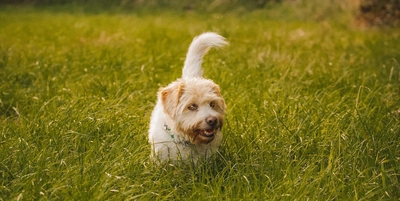Can Dogs Get Depressed?
- 04 Oct 2023
- 3m read

Yes, dogs can get depressed.
Man's best friend is not immune to the blues. In this article, we'll explore the signs, causes, and strategies for helping a depressed dog.
Signs of Depression in Dogs
Recognising the signs of depression in dogs is the first step in providing them with the support and care they need. Here are some telltale indicators:
Withdrawal and social isolation
A once social dog suddenly becomes aloof, avoiding human and canine companionship.
Changes in appetite
Just like humans, dogs may lose interest in food or start eating excessively when they're feeling down.
Lethargy
An once energetic pup turning into a couch potato? It could be a sign of depression.
Sleep pattern changes
Depressed dogs may sleep excessively or, conversely, suffer from insomnia.
Excessive licking or chewing
If your dog obsessively licks or chews on themselves, it can indicate emotional distress.
Loss of interest in play
Dogs with depression often lose interest in their favourite games and toys.
Potty accidents
House-trained dogs might have accidents indoors when they're depressed.
Destructive behaviour
Chewing furniture, digging, or destroying objects can be a manifestation of their inner turmoil.
Causes of Depression in Dogs
Understanding what could be causing your dog's depression is crucial for effective intervention. Here are some common triggers:
Loss of a companion
The death of a fellow pet or a close human companion can deeply affect a dog.
Major life changes
Moving to a new home, the arrival of a new family member (human or pet), or changes in daily routines can be distressing for dogs.
Physical illness
Chronic pain or illness can lead to depression in dogs.
Traumatic experiences
Past abuse, accidents, or traumatic events can haunt dogs, causing long-term emotional distress.
Genetic predisposition
Some dog breeds are more prone to depression due to their genetic makeup.
Environmental factors
A lack of mental stimulation, exercise, or exposure to natural light can contribute to depression.
Separation anxiety
Dogs that suffer from separation anxiety when their owners are away can also develop depressive symptoms.
How to Help a Depressed Dog
Once you've identified that your dog is experiencing depression, it's time to take action. Here are strategies to help your furry friend bounce back:
Consult your vet
Rule out any underlying medical conditions causing the depression. Your vet can recommend appropriate treatment or therapies.
Maintain a routine
Dogs thrive on consistency. Stick to a daily routine for feeding, exercise, and playtime.
Engage in interactive play
Spend quality time with your dog through engaging games and activities. Puzzle toys can be mentally stimulating.
Socialisation
Encourage positive interactions with other dogs and humans to combat isolation.
Fresh dog food
Consider transitioning to fresh dog food like Butternut Box. It's high-quality, human-quality ingredients can support your dog's overall health. We also offer free 24/7 advice from our vet nurse team.
Exercise
Regular exercise is not just essential for physical health; it can also improve your dog's mood. Take daily walks and explore new environments together.
Training and mental stimulation
Keep your dog's mind active with training sessions and puzzle-solving games.
Medication or therapy
In severe cases, your vet may recommend medication or behavioural therapy to manage your dog's depression.
Love and patience
Shower your pup with affection, understanding, and patience during their recovery.
Monitor progress
Keep an eye on your dog's progress. If their depression persists or worsens, consult your vet for further guidance.




